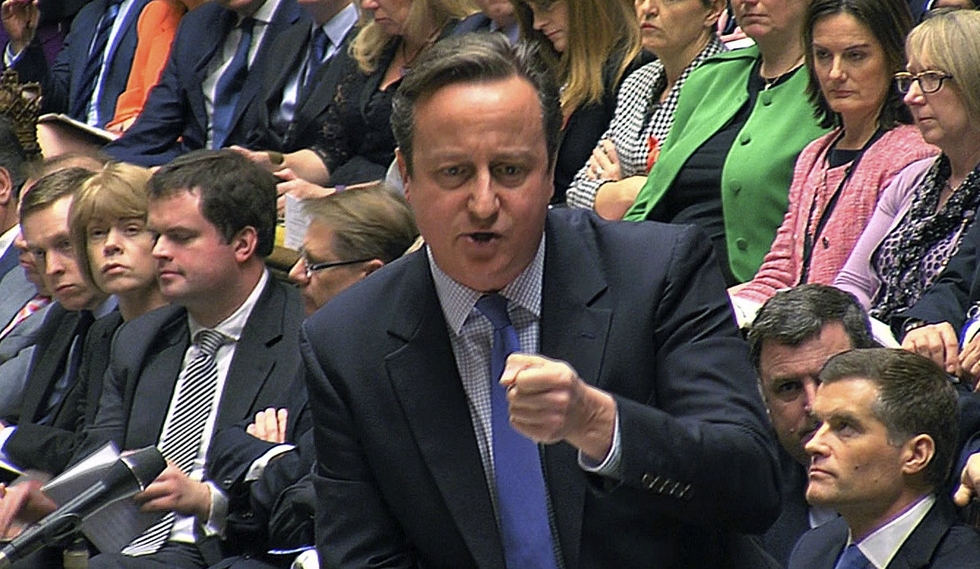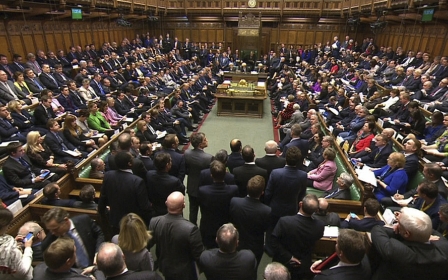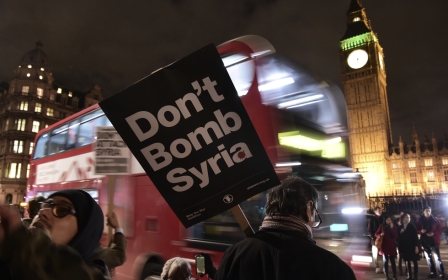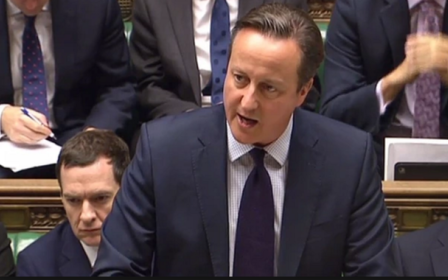UK's rush to war in Syria ignores realities

Like others around the country, I followed a speech British Prime Minister David Cameron made in parliament on 26 November with great interest.
For weeks, a wide section of the British public had been waiting for this address. Cameron's speech was on a major issue - perhaps the greatest issue for modern states: War.
Cameron said that Britain should join the US-led coalition against the Islamic State, or Daesh, in Syria and not just in Iraq. He presented before parliament reasons that, in his opinion, justified such involvement.
There is nothing boring in the democratic process when it is working, not least when it is focused on the issue of war, an issue that touches peoples' lives and involves the squandering of resources.
Yet, something else hung over the lower chamber in parliament, and it touched everyone. It was the disaster of the British-American war in Iraq. Perhaps Cameron would not have had to ask parliament for support in bombing Daesh inside Syria had it not been for the decision by Blair's government to take part in the invasion of Iraq in 2003, a decision that led Iraq to the condition it finds itself in today.
Britain is already taking part in the Western coalition against Daesh in Iraq. But the Western military effort rests upon the request of a legitimate Iraqi government, so British involvement there is not illegal.
However, the situation is different in Syria, for there is no consent from a Syrian government. Furthermore, such an intervention does not have international legal protection. So, if Cameron is planning to send the Royal Air Force to bomb Syria, he would have to obtain the support of his country's parliament first.
How, then, did the British Prime Minister address parliament on this issue? Quite simply, Cameron paid no particular attention to international law. Surely, the prime minister knows that the United Nations resolutions that call for an international cooperation against Daesh do not provide legal legitimacy for any military action of this sort in Syria.
What the United States and its coalition member states are doing in Syria, and what France recently started doing, does not enjoy an international legal mandate. The other justification that may, indeed, be resorted to is self-defence. The recent wave of attacks in Paris served the British prime minister well.
Daesh does indeed pose a major threat to Western societies and may not hesitate to attack Britain if it can. British security agencies have so far aborted a number of Daesh terrorist plots against Britain. There is also the liberal argument, if one may say so, for intervention.
Daesh does pose a danger to the lives of the people who live in the areas under its control; it also poses a threat to the stability of the societies in which these people live in terms of the savage policies and primitive laws it imposes on the cities and towns of eastern Syria. There is also its repression of religious minorities and the restrictions it imposes on liberties.
However, Cameron does understand that justifications for intervention are not sufficient. When a democratic nation decides to wage war - especially when it is a war out of choice rather than out of necessity - one must explain how victory in such a war can be achieved.
Haunted by the Iraq disaster, as he should be, the British prime minister explained that his country's role in the war will be restricted to air raids launched against the regions that are under the control of Daesh and that there would be no ground operations.
Now, it does not take a parliamentarian or professional politicians to realise that air strikes on their own would not defeat Daesh - and that the coalition has been carrying out these strikes for months without any tangible results. But Cameron said that he had intelligence reports that 70,000 anti-Daesh Syrian fighters were ready to fight the battle on the ground if foreign military aid is made available.
These, in brief, are the arguments made by the British prime minister. However, what he left out, and what would have been devastating for his entire proposal, is crucial.
For instance, the prime minister did not tell parliament what difference a limited British contribution to the air strikes would make when it comes to the results of the war.
The truth is that the British military role will not change the course of the war against Daesh, especially after France threw its entire weight on the side of the Americans.
It seems Britain is more interested in securing a certain political role in Syria than in settling the war. What the prime minister also did not say was that neither Britain nor America, nor for that matter any of the coalition members, know for sure whether any real details on supposed 70,000-strong anti-Daesh force.
What observers of the Syrian issue do know, is that the largest proportion of those who are opposed to Daesh in Northern and Eastern Syrian happen to be militias of the Democratic Union Party (PYD), which is nothing but a Syrian wing of the Kurdish Workers Party (PKK) - a group that is designated a terrorist organisation in Turkey and in a wide range of Western countries.
During the past few months, the Syrian Kurdish militias perpetrated innumerable crimes against Syrian Arab and Turkmen citizens within the towns and cities that fell under their control. The crimes included ethnic cleansing. Since Daesh cannot ultimately be defeated without a significant Turkish role, it would be difficult to imagine a confrontation with Daesh on the ground relying on Kurdish forces because Turkey deems these forces to be a terrorist threat to it as well as to the Syrian Arabs and Turkmen.
The other Syrian fighting groups, whether within the Free Syrian Army or outside it, also oppose Daesh. But these groups will not dedicate part of their effort in the fight against Daesh without fighting the Assad regime, its troops and the troops of his Iranian allies at the same time. And what about the position vis-a-vis the Russian role, especially since Russia has, as of 30 September, become a principal party to the conflict in Syria?
Russia entered the Syrian arena with the aim of confronting Daesh and terrorism. Yet, evidence shows that much of the Russian military effort has been dedicated to safeguarding the Assad regime and targeting Syrian opposition groups that are known for their moderation.
What would be the stance of the US-led coalition countries vis-a-vis the Russian role at a time when the Syrian skies are crowded with Russian, American and French planes, and are likely soon to be joined by British planes as well? And how will Turkey, and other regional states such as Saudi Arabia and Qatar, play the role expected of them in the fight against Daesh while they watch Russian planes destroy their own allies within the Syrian opposition?
The other issue that is no less important has to do with the horizons of this war. Several years ago, the American forces and their allies, such as the Iraqi Awakenings (Sahawat), managed to force the parent of Daesh, Iraq's al-Qaeda organisation, out of Anbar. Then al-Qaeda splintered into small groups that spread into various parts of Iraq and carried out an endless series of attacks on civilians and on Iraqi government targets.
A few years later, it re-emerged under the name of Daesh and managed to seize nearly one third of the entire Iraqi territory. It is certain that forcing Daesh out of Raqqa and out of other places, where it is in control inside Syria, will not make a big difference with regard to the fate of Daesh or the fate of Syria.
Here lies the extreme short-sightedness of the British approach, and even the Western approach as a whole, vis-a-vis the Syrian problem. Without bringing down the Syrian regime and building a new governance institution in Damascus around which the majority of Syrians may rally, there will not be an end in sight for Daesh or for the danger it poses.
Syrians alone are capable of eradicating this plague. It is difficult to envisage a situation in which the Syrian people are likely to join the battlefield unless they have a Syrian state that expresses their will and unite their forces.
- Basheer Nafi is a senior research fellow at Al Jazeera Centre for Studies.
The views expressed in this article belong to the author and do not necessarily reflect the editorial policy of Middle East Eye.
Photo: A video grab from footage broadcast by the UK Parliament’s Parliamentary Recording Unit shows British Prime Minister David Cameron speaking at the dispatch box in the House of Commons in central London on 2 December, 2015 during the debate on a motion to join air strikes on Islamic State militant targets in Syria (AFP/PRU).
New MEE newsletter: Jerusalem Dispatch
Sign up to get the latest insights and analysis on Israel-Palestine, alongside Turkey Unpacked and other MEE newsletters
Middle East Eye delivers independent and unrivalled coverage and analysis of the Middle East, North Africa and beyond. To learn more about republishing this content and the associated fees, please fill out this form. More about MEE can be found here.





